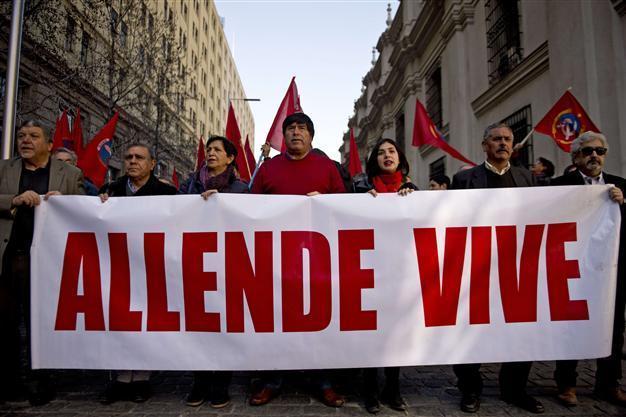Chileans honor Pinochet-era victims, demand prison closure
SANTIAGO - Agence France-Presse

Human Rights activists hold a sign reading "Allende lives" as they rally outside La Moneda presidential palace in Santiago, on September 11, 2015, on the 42nd anniversary of the military coup led by General Augusto Pinochet that deposed President Salvador Allende. AFP Photo
Chileans took to the streets on Sept.13 to honor the victims of Augusto Pinochet's 1973-1990 regime and to demand the closure of a special "luxury" prison for ex-dictatorship officials.
At the end of the vast, peaceful march in the capital Santiago, riot police used tear gas and water cannons to disperse a small group of violent masked protesters. Four people were arrested.
People here are still grappling with the legacy of the dictatorship as they work to unravel laws set during the period and bring ex-military officials and rights abusers to justice.
"The wound remains open because the truth has not been told, and justice has not been served," said Tania Nunez, 52, who marched with a poster picturing some of the more than 3,200 people -- mostly leftist activists -- slain during the dictatorship.
Others carried signs with black and white photos of killed loved ones.
On September 11, 1973, Chile's military toppled the elected socialist government of president Salvador Allende.
The Sept.13 march made its way by La Moneda, the presidential palace that was bombed by air force jets during the coup, and ended at a cemetery where regime victims are buried.
Recordings of Allende's speeches blared from loudspeakers carried by the marchers.
Among the protesters was 52-year-old Monica Figueroa, whose father died after he was arrested in 1974.
"While there is no truth and justice, there will be no reconciliation, and we will always be divided as a people," she said.
Allende's daughter, Isabel Allende Bussi, a socialist politician, was also at the rally.
Jose Dalquin, who at 24 was born after Pinochet left office, said he was outraged by the "pact of silence" between Chilean influential conservatives and the military that "prevents us from obtaining justice."
While the military denies any such "pact," outrage is mounting over Punta Peuco, a special prison built 20 years ago for those convicted of atrocities during the dictatorship.
Nestled in a bucolic setting with sweeping views over the snowcapped Andes, the prison currently holds 104 ex-members of Pinochet's security forces serving time for kidnap, torture and murder.
Inmates have individual rooms, tennis courts, terraces and barbecues.
Visits are allowed all day long inside the cells -- a level of privacy the rest of Chile's 54,000 inmates can only dream of, in a country whose prisons are 70 percent over capacity.
"Punta Peuco should vanish, there should not be special jails for assassins," said 54-year-old Patricia Abarca, who shed tears of anger.
Several marchers waved signs demanding the prison's closure.
Victims' family members want the Punta Peuco inmates to finish their sentences in the same conditions as any other prisoners.
The government of President Michelle Bachelet denies that it is a "luxury" prison, as critics charge, and said that plans are underway to close the site.
Punta Peuco was built in 1995, five years after democracy was restored but when Pinochet was the head of Chile's armed forces and still a powerful political figure.
Pinochet died in 2006 without ever facing trial, despite a string of international attempts to bring him to justice.
